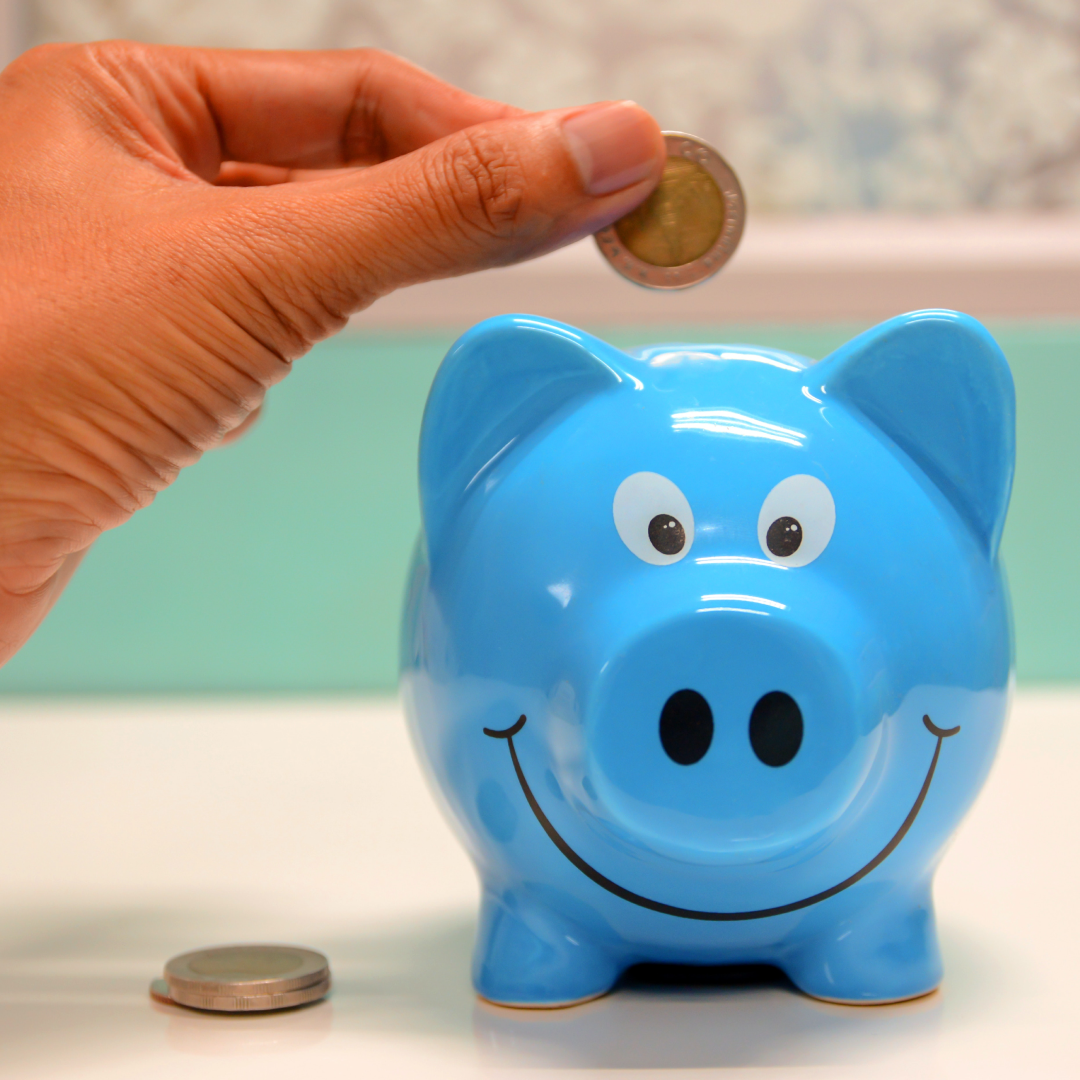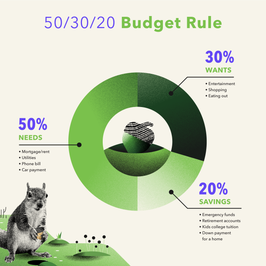How to Save Money: 15 Helpful Tips

Whether you dream of buying a home with a picket fence or a new car, saving money is key to reaching your goals. But sometimes, it can feel tough.
If you want to learn how to save money, these 15 tips can help you get started:
1. Reduce credit card debt
If you’re like many people, you have credit card debt. While credit cards can be convenient ways to cover everyday purchases and even emergency expenses, they are an expensive form of debt if you carry a balance. According to the Federal Reserve, the average annual percentage rate (APR) on credit cards that accrue interest was 18.43%. With such high-interest rates, your credit card balance can balloon out of control.
You can save money by paying down your credit card debt. Instead of paying only the minimum, pay as much toward the balance as you can. By making extra payments, you’ll reduce how much interest accrues.
Depending on your habits, you may want to use the debt avalanche or the debt snowball methods to manage your credit card debt. Regardless of which approach you choose, these debt repayment strategies will help you get rid of your credit card balances faster — and free up cash for your savings goals.
2. Set a savings goal
When you're learning how to save money, it can be helpful to set specific goals for your money. To establish your goal, use these tips:
Write it down
Whatever your goal, write down exactly what you want to accomplish, how much you need to make it happen and your targeted time frame. For example, you may want to buy a home, so your goal might be “Save $20,000 for a down payment on a house within two years.”
Open an account
Some people find it helpful to open separate savings accounts for each goal rather than stashing all of their cash into one account so they can track their progress more easily.
Set up visual reminders
To help you stay motivated when you start saving money, set up visual reminders. If you want to become a homeowner, print off a picture of your dream house and put it on your computer (especially helpful if you like to shop online!). Or if you want to travel, make the Eiffel Tower or Taj Mahal your phone backdrop. Having a visual reminder of your goals in front of you will help you stay focused and curb unnecessary spending.
3. Build an emergency fund
Before saving for other goals, it’s a good idea to establish an emergency fund — a pot of cash you can use for unexpected expenses, like a car repair or a sudden vet bill.
Experts recommend keeping three to six months’ worth of your expenses in an emergency fund. If that amount is so large that it’s overwhelming, start smaller. Set a goal to build an emergency fund of $500 or $1,000. Any financial cushion can come in handy when an emergency strikes, and it allows you to get into the habit of saving money.
4. Use an app
When you’re on a limited budget, finding extra money to put into a savings account can be hard. But don’t let that discourage you from setting goals and saving. With an app like Acorns, you can open a checking account with as little as $25.
Once you have an account, you can utilize Acorns’ round-ups® feature to boost your investments. Whenever you make a purchase with your Acorns checking account or a linked credit card, Acorns will round up your purchase amount to the next full dollar. Then, Acorns will invest your spare change into your Acorns Invest account.
For example, let’s say you buy groceries and your total comes to $49.15. Acorns will round up the purchase amount to $50; the additional $0.85 will be invested in your investment account.
Over time, your spare change can cause your investment account to grow.
5. Stow away your tax refund
After you file your tax return in April each year, you may receive a refund from the IRS. In fact, the average tax refund was $3,039 in 2022.
If you receive a tax refund, resist the urge to spend it. Instead, you can make significant progress toward your goals by stashing your tax refunds in your savings account.
6. Use the 50/30/20 budget rule
If you’re having trouble finding money to set aside for your goals, consider creating a budget using the 50/30/20 rule. With this budgeting strategy, you allocate your income according to the following guidelines:
-
50% of your after-tax income goes toward essential living expenses and monthly bills, such as your rent or mortgage, utilities and groceries.
-
30% of your after-tax income is for your “wants,” such as meals at restaurants, trips to the movies or a new tablet.
-
20% of your after-tax income is for saving for retirement, paying down student loans or credit card debt and planning for long-term goals.
For example, let’s say your take-home pay is $4,000 per month. Under the 50/30/20 rule, $2,000 per month is for housing, utilities, groceries, and transportation. For splurges and entertainment, you have $1,200 per month to spend. And you have $800 to put toward debt or save each month.
MoneyFit.org, a non-profit credit counseling organization, has a 50/30/20 calculator you can use to see how much money you can spend in each category.
7. Cut spending where you can
As you create your budget, you may find that your debt payments or housing expenses are higher than the recommended guidelines. To compensate, look for items you can trim from your budget so you can save more money. Here are a few ideas to help you get started:
Shop around for car insurance
It’s a good idea to shop around and compare car insurance quotes once a year; you may be surprised to find out you can save hundreds by switching to another company. Jerry or The Zebra are useful resources for getting quotes from insurance companies.
Plan your meals
If you find yourself dining out or getting takeout often, you can save money by planning your meals and eating at home instead. EatWell101 has a free online meal planning tool you can use to find recipes and build a shopping list before you go to the grocery store.
Reduce your entertainment spending
You don’t have to spend a lot of money to have fun; there are many free resources you can use instead. For example, you can search for free local events at EventBrite, and your community library may offer free tickets to museums, botanical gardens, and even concerts.
Cancel unused subscriptions
You likely have subscriptions to services you don’t use anymore. Go through your phone’s settings and cancel unused app subscriptions, and check your credit card statements to see if there are other services you pay for but don’t use. If that process is too time-consuming, another option is to use a service like Trim which does it for you and takes a cut of your savings.
8. Automate your savings
When it comes to developing a savings plan, automation is critical. By setting up automatic transfers from your checking account to your savings account, you can make saving a priority without thinking about it. Most online banking apps offer automated savings programs, and you can set up automatic transfers on a monthly, weekly or even daily basis.
If you receive a raise, make sure you adjust your automatic transfers to account for new, higher income. If you save the paycheck increase, you can save money without having to cut back on your spending money.
9. Take advantage of cash back apps
With cash back apps like Acorns and Rakuten, you can earn money back on your everyday purchases. When you shop through the apps at participating stores, the app will give you a percentage of your total in cash back rewards or deposits to your investment account. Over time, those rewards can add up.
For example, Acorns users can earn bonus investments when they shop at Walmart, Macy’s and even Priceline through Acorns Earn.
10. Stash unexpected windfalls
From time to time, you may receive an unexpected sum of cash. Perhaps you get a bonus from work, a gift from a relative, or you win big at the casino. Whatever the case may be, saving those windfalls instead of spending them will help you achieve your financial goal faster.
11. Sell items you don’t use
You likely have clutter in your home in the form of unused clothes, electronics, toys or gift cards. Instead of allowing those things to take up valuable space, you can turn those items into cash by selling them online.
-
Clothes: You can sell clothes, shoes, handbags, and other accessories on Poshmark and ThredUp.
-
Electronics: If you have cell phones, laptops, or tablets gathering dust, you can sell them for cash on Gazelle.
-
Gift cards: You probably have a gift card or two that you’ll never use. In fact, a recent study found that 47% of Americans had unused gift cards in their homes, with an average balance of $175. If you sell those cards on sites like Raise or CardCash, you can get up to 90% of the card’s value in cash.
-
Toys: Collectibles and children’s toys can be sold on eBay and Mercari.
-
Furniture: If you have larger items you want to get rid of, you can see them on the Facebook Marketplace, Craigslist or OfferUp.
12. Rent out extra space
You can earn extra money and save more cash by renting out unused space in your home. Whether you have an empty closet or an unused parking spot, you can rent those spaces out on Neighbor.com or SpotHero.
13. Establish waiting periods before big purchases
With online shopping becoming so prevalent, it’s easy to spend money and make purchases you regret.
To control your spending, delete your saved credit card information from your accounts and set rules for yourself. You don’t have to eliminate shopping entirely but establish waiting periods for discretionary purchases. For example, you may set the rule that any purchase of $100 or more requires you to wait 30 days before you can complete the transaction.
This approach curbs impulse buys, and you may find that you no longer want that item at the end of the 30-day waiting period.
14. Look for unclaimed cash
When a business or government agency owes you money but has an outdated address, the money is designated “unclaimed property.”
Unclaimed funds can be from an old bank account, insurance policy or tax refund. According to the National Association of Unclaimed Property Administrators, about one in 10 Americans have unclaimed property in their names, and there are billions of unclaimed dollars.
You can find unclaimed dollars by searching on Unclaimed.org or MissingMoney.com. If you find that there is unclaimed property in your name, you can file a claim by filling out a form and sending it to your state’s unclaimed property office. It only takes a few minutes to do.
15. Start a side hustle
If you’re figuring out how to save money and achieve your goals as quickly as possible, starting a side hustle can be a smart idea. Side Hustle Nation reported that the average individual with a side gig earns $1,122 per month, so it can be a great way to increase your savings.
There are many ways to earn money beyond a full-time job, such as blogging, delivering groceries or walking dogs. Convinced? Here are seven side hustles you can use to earn extra income while working full-time.
This content is for informational purposes only and is not intended as financial advice. The views expressed are generalized and may not be appropriate for all viewers. Investing involves risk including the loss of principal. Acorns is not a bank. Acorns Visa™ debit cards are issued by Lincoln Savings Bank or nbkc, members FDIC. Round-Up investments from Acorns Checking accounts will be processed to your Acorns Invest account on an ongoing basis if the Round-Ups® setting is set to automatic. Round-Up investments from an external account, will be processed when your Pending Round-Ups® reach or exceed $5.
This material has been presented for informational and educational purposes only. The views expressed in the articles above are generalized and may not be appropriate for all investors. The information contained in this article should not be construed as, and may not be used in connection with, an offer to sell, or a solicitation of an offer to buy or hold, an interest in any security or investment product. There is no guarantee that past performance will recur or result in a positive outcome. Carefully consider your financial situation, including investment objective, time horizon, risk tolerance, and fees prior to making any investment decisions. No level of diversification or asset allocation can ensure profits or guarantee against losses. Article contributors are not affiliated with Acorns Advisers, LLC. and do not provide investment advice to Acorns’ clients. Acorns is not engaged in rendering tax, legal or accounting advice. Please consult a qualified professional for this type of service.









